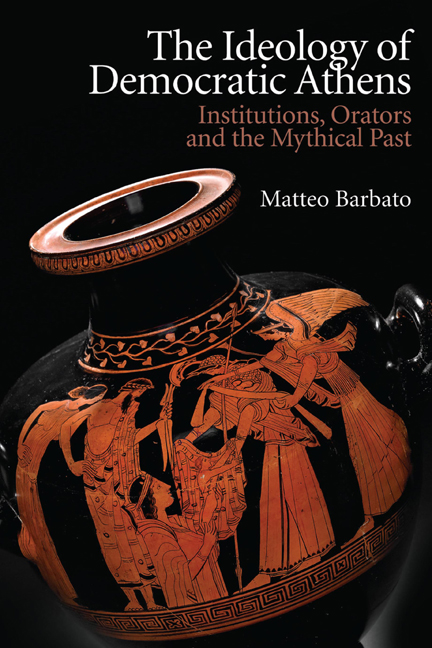Book contents
- Frontmatter
- Contents
- List of Tables and Illustrations
- Preface
- Abbreviations
- 1 Introduction
- 2 Myth and Athenian Democracy
- 3 The Discursive Parameters of Athenian Democratic Institutions
- 4 Exclusiveness and Eugeneia in the Myth of Autochthony
- 5 Between Charis and Philanthrōpia: The Heraclidae
- 6 Fading Shades of Hybris: The Attic Amazonomachy
- 7 Combining Hybris and Philanthrōpia: The Myth of Adrastus
- 8 Conclusions
- Bibliography
- Index Locorum
- General Index
3 - The Discursive Parameters of Athenian Democratic Institutions
Published online by Cambridge University Press: 17 October 2020
- Frontmatter
- Contents
- List of Tables and Illustrations
- Preface
- Abbreviations
- 1 Introduction
- 2 Myth and Athenian Democracy
- 3 The Discursive Parameters of Athenian Democratic Institutions
- 4 Exclusiveness and Eugeneia in the Myth of Autochthony
- 5 Between Charis and Philanthrōpia: The Heraclidae
- 6 Fading Shades of Hybris: The Attic Amazonomachy
- 7 Combining Hybris and Philanthrōpia: The Myth of Adrastus
- 8 Conclusions
- Bibliography
- Index Locorum
- General Index
Summary
Myth was virtually omnipresent in the private and public life of the Athenians. Their extensive knowledge of the Greek mythical tradition meant that the Athenians were potentially able to appreciate the ideological value of different mythical variants. But how could the Athenians use myth (and public discourse in general) to construct their shared ideas and values? This chapter makes the case that this process of ideological practice was enabled and influenced by the institutions of the democracy, and shows that Athenian democratic institutions conditioned the behaviour of Athenian political actors and the construction of Athenian democratic ideology through sets of discursive parameters distinctive to each institution.
The outcome of this chapter is twofold. On the one hand, it establishes a solid framework for the analysis of the specific uses of myth in Athenian ideological practice carried out in my case studies (Chapters 4 to 7). On the other, it illustrates some of the characteristics of Athenian democratic ideology described in the Introduction (Chapter 1). It highlights the constructive function of ideology typical of the culturalist tradition as well as the normative value characteristic of the Marxist tradition. More importantly, it shows the bidirectional nature of Athenian democratic ideology due to the contribution of both the mass and the elite to the process of ideological practice taking place within Athenian democratic institutions. I shall thus investigate the nature and functions of the state funeral for the war dead, the lawcourts, the Assembly and the Council, and the dramatic festivals, and determine the discursive parameters of these institutions and the respective roles played by the mass and the elite acting within them.
THE STATE FUNERAL FOR THE WAR DEAD
The ideological relevance of the state funeral for the war dead and the funeral speech (epitaphios logos) has been long emphasised. Nicole Loraux, in particular, interpreted the funeral oration as ideological in the sense that it concealed Athens’ internal divisions and imperial vocation. As I have suggested in the Introduction, the epitaphios logos and the state funeral should be read in the light of the notion of ‘imagined community’ elaborated by Benedict Anderson.
- Type
- Chapter
- Information
- The Ideology of Democratic AthensInstitutions, Orators and the Mythical Past, pp. 57 - 81Publisher: Edinburgh University PressPrint publication year: 2020



